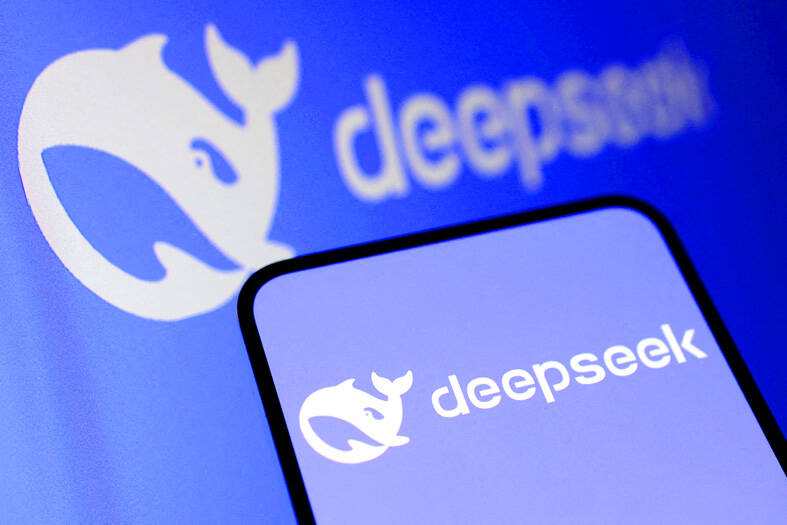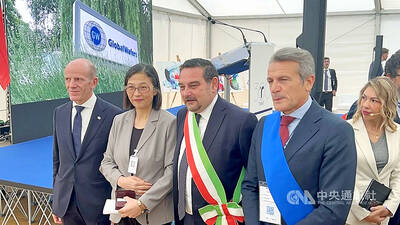Chinese artificial intelligence (AI) phenomenon DeepSeek (深度求索) revealed some financial numbers on Saturday, saying its “theoretical” profit margin could be more than five times costs, peeling back a layer of the secrecy that shrouds business models in the AI industry.
The 20-month-old start-up that rattled Silicon Valley with its innovative and inexpensive approach to building AI models, on X said that its V3 and R1 models’ cost of inferencing to sales during 24 hours on the last day of February put profit margins at 545 percent.
Inferencing refers to the computing power, electricity, data storage and other resources needed to make AI models work in real-time.

Photo: Reuters
However, DeepSeek added a disclaimer in details it provided on GitHub, saying its actual revenues are substantially lower for various reasons, including the fact that only a small set of its services are monetized and it offers discounts during off-peak hours. Nor do the costs factor in all the research and development, and training expenses for building its models.
While the eye-popping profit margins are hypothetical, the reveal comes at a time when the profitability of AI start-ups and their models is a hot topic among technology investors.
Companies from OpenAI Inc to Anthropic PBC are experimenting with various revenue models, from subscription-based to charging for usage to collecting licensing fees, as they race to build ever more sophisticated AI products.
However, investors are questioning these business models and their return on investment, opening a debate on the feasibility of reaching profitability any day soon.
The Hangzhou-based start-up on X said that its online service had a “cost profit margin of 545 percent” and gave an overview of its operations including how it optimized computing power by balancing load — that is managing traffic so that work is evenly distributed between multiple servers and data centers.
DeepSeek said it innovated to optimize the amount of data processed by the AI model in a given period, and managed latency — the wait time between a user submitting a query and receiving the answer.
In a series of unusual steps beginning early last week, DeepSeek, which has espoused open-source AI, surprised many in the industry by sharing some key innovations and data underpinning its models, in contrast to the proprietary approach of its biggest US rivals like OpenAI.

RECYCLE: Taiwan would aid manufacturers in refining rare earths from discarded appliances, which would fit the nation’s circular economy goals, minister Kung said Taiwan would work with the US and Japan on a proposed cooperation initiative in response to Beijing’s newly announced rare earth export curbs, Minister of Economic Affairs Kung Ming-hsin (龔明鑫) said yesterday. China last week announced new restrictions requiring companies to obtain export licenses if their products contain more than 0.1 percent of Chinese-origin rare earths by value. US Secretary of the Treasury Scott Bessent on Wednesday responded by saying that Beijing was “unreliable” in its rare earths exports, adding that the US would “neither be commanded, nor controlled” by China, several media outlets reported. Japanese Minister of Finance Katsunobu Kato yesterday also

‘DRAMATIC AND POSITIVE’: AI growth would be better than it previously forecast and would stay robust even if the Chinese market became inaccessible for customers, it said Taiwan Semiconductor Manufacturing Co (TSMC, 台積電) yesterday raised its full-year revenue growth outlook after posting record profit for last quarter, despite growing market concern about an artificial intelligence (AI) bubble. The company said it expects revenue to expand about 35 percent year-on-year, driven mainly by faster-than-expected demand for leading-edge chips for AI applications. The world’s biggest contract chipmaker in July projected that revenue this year would expand about 30 percent in US dollar terms. The company also slightly hiked its capital expenditure for this year to US$40 billion to US$42 billion, compared with US$38 billion to US$42 billion it set previously. “AI demand actually

Jensen Huang (黃仁勳), founder and CEO of US-based artificial intelligence chip designer Nvidia Corp and Taiwan Semiconductor Manufacturing Co (TSMC, 台積電) on Friday celebrated the first Nvidia Blackwell wafer produced on US soil. Huang visited TSMC’s advanced wafer fab in the US state of Arizona and joined the Taiwanese chipmaker’s executives to witness the efforts to “build the infrastructure that powers the world’s AI factories, right here in America,” Nvidia said in a statement. At the event, Huang joined Y.L. Wang (王英郎), vice president of operations at TSMC, in signing their names on the Blackwell wafer to

Taiwan-based GlobalWafers Co., the world’s third largest silicon wafer supplier, on Wednesday opened a 12-inch silicon wafer plant in Novara, northern Italy - the country’s most advanced silicon wafer facility to date. The new plant, coded “Fab300,” was launched by GlobalWafers’ Italian subsidiary MEMC Electronics Materials S.p.A at a ceremony attended by Taiwan’s representative to Italy Vincent Tsai (蔡允中), MEMC President Marco Sciamanna and Novara Mayor Alessandro Canelli. GlobalWafers Chairwoman Doris Hsu (徐秀蘭) said the investment marked a milestone in the company’s expansion in Europe, adding that the Novara plant will be powered entirely by renewable energy - a reflection of its